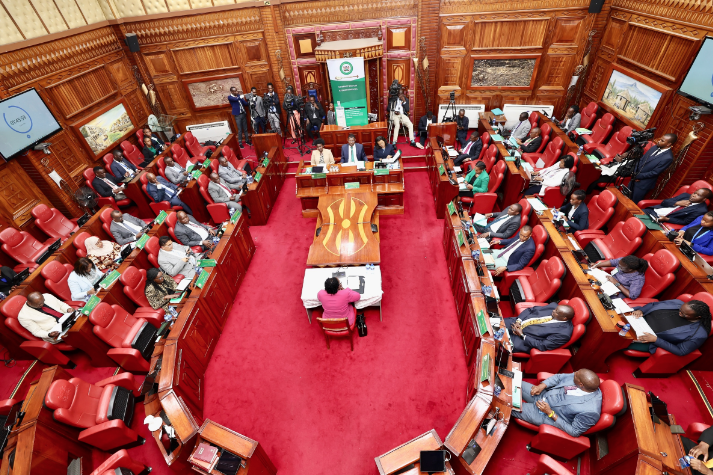
It has been a dynamic week in Parliament, marked by active committee engagements both within the capital and in the field.
Several key parliamentary committees advanced their oversight and legislative mandates through vetting sessions, site inspections, public petitions, and bill mediation efforts.
The National Assembly Committee on Defence, Intelligence and Foreign Relations conducted rigorous approval hearings this week, vetting nominees appointed by President William Ruto as ambassadors, high commissioners, consuls-general, and deputy heads of mission.
This vetting follows President Ruto’s major recent realignment of Kenya’s Foreign Service, where 20 diplomats were posted to key missions across Africa, Europe, Asia, and North America.
The parliamentary approval process is an essential step to ensure qualified officials abroad represent Kenya.
Meanwhile, the Senate Committee on Labour and Social Welfare, chaired by Senator Julius Murgor (West Pokot), convened sessions in Mombasa to hear a petition presented by civil society activist Zedekiah Adika.
The petition raised urgent concerns about exclusion of persons with disabilities (PWD) from government services, despite constitutional guarantees of accessibility.
During the sessions, advocates shared distressing accounts of systemic barriers, such as broken lifts and lack of ramps in key government buildings, forcing PWDs to be carried up stairs.
The committee met with Mombasa Governor Abdulswamad Sheriff Nassir, county officials, disability representatives, and engineers from the National Construction Authority.
Adika urged the committee to institute a formal inquiry and recommend reforms to make public buildings in Mombasa accessible.
Nassir acknowledged progress, noting some county departments had moved to accessible premises and ramps were installed at executive offices.
However, he highlighted challenges caused by intergovernmental disputes, especially over the Betting Control Building, which remains under the Ministry of Housing’s jurisdiction despite the county’s offer to repair its facilities.
“We offered to repair the lifts at our own cost, but the ministry responded by asking us to pay rent,” the governor said.
In another major oversight activity, the National Assembly Public Investments Committee on Governance and Education, led by chairperson Wanami Wamboka (Bumula), conducted an inspection tour of the University of Eldoret.
The committee audited the stalled amphitheatre project valued at Sh373 million, which started in June 2019 but has remained incomplete beyond its expected December 2020 completion date.
Members raised concerns about contract mismanagement, with Embakasi West MP Mark Mwenje describing the process as chaotic due to contract termination and the involvement of subcontractors.
“This project was completely mismanaged by allowing a contract termination and then onboarding sub-contractors. This has cost a lot of money, and the whole process is chaotic,” Mwenje said.
University Vice Chancellor Prof. Thomas Kimeli Cheruiyot cited funding difficulties as the primary cause of the project’s collapse.
The committee called for an investigation into alleged financial misappropriation and urged that those found culpable face prosecution.
Parliament has also appointed 18 lawmakers to represent the National Assembly in two mediation committees aimed at aligning versions of critical legislation stalled in bicameral negotiations.
The Mediation Committees are tasked with reconciling differences in the National Disaster Risk Management Bill (National Assembly Bill No. 24 of 2023) and the Startup Bill (Senate Bill No. 14 of 2022).
The Disaster Risk Management Bill seeks to bolster Kenya’s systems for preparedness, response, and recovery from disasters, while the Startup Bill focuses on promoting innovation, entrepreneurship, and job creation by supporting startup enterprises across the country.











